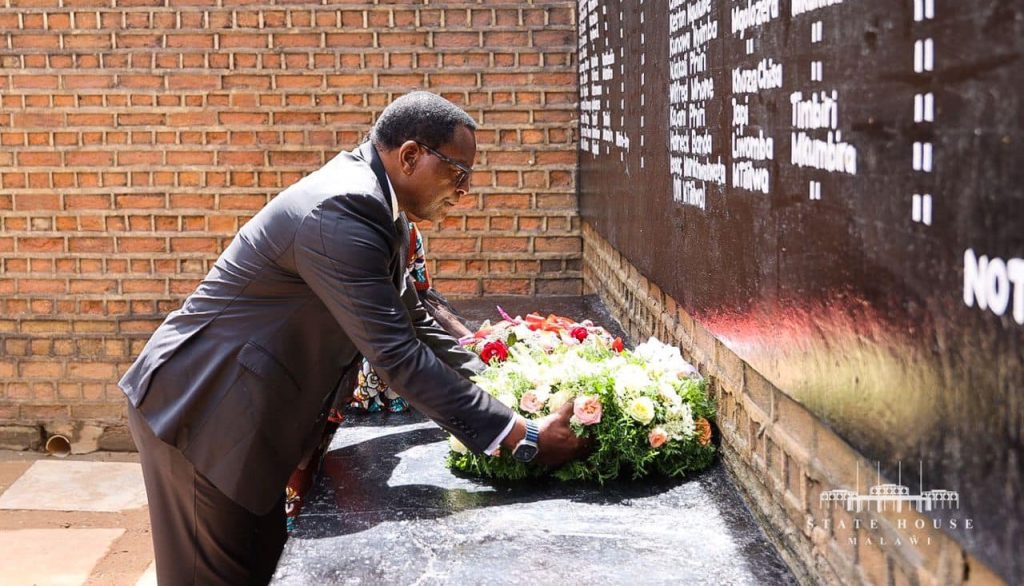A song of freedom
The day 3rd March holds a profound significance in the history of Malawi, marking the commemoration of Martyrs’ Day a tribute to those who sacrificed their lives during the country’s struggle for independence.
Among the many ways in which we commemorate the day is through singing. One of the songs that has become iconic and synonymous with the day is done by one of the country’s renowned artists Mjura Mkandawire.

Against this historical backdrop, the narrative of Mjura Mkandawire, a prominent figure in Malawi’s musical landscape, unfolds with a production from the 1960s.
Mjura Mkandawire’s song Pakupoka Wanangwa, a production done in collaboration with MBC Queens rings a bell to those who know the history behind Martyrs’ Day, it is known to some while the same cannot be said about others.
The late Mjura Mkandawire, a citizen of Chiholo Village in Traditional Authority Chikulamayembe in Rumphi, was a versatile ethno-composer and his music legacy rests on his composition and recording of his two productions Kunali John Chilembwe and Pakupoka Wanangwa.
Most Malawians are familiar with the Kunali John Chilembwe song so I will skip details on that let us talk about Pakupoka Wanangwa which describes Martyrs’ Day.
Born and raised in Malawi Mjura composed Pakupoka Wanangwa, a vehicle to articulate the story of resilience, hope and unity that define the Malawian spirit.
A storyteller in the realm of melodies, Mjura creatively crafted a musical composition that to this day still echoes the struggles and triumphs embedded in Malawi’s history.
It is like his song is a living testimony to the sacrifices made during the fight for independence, ensuring that the legacy of the martyrs lives on through the rhythmic heartbeat of his music.
The song follows a traditional verse-chorus structure, characterised by a cyclical arrangement where three verses intertwine with a recurring chorus creating a repetitive motif.
The first verse talks about the price that has to be paid in pursuit of freedom or in this case the price that others paid to acquire the freedom that we now freely enjoy.
The verse goes:
Pakupoka wanangwa (While you attain freedom)
Pali vipyo na kufwa (The price is hardships and death)
Madindi ghakuzura (Graves become full)
Vitanda vikugona (Dead bodies lay around)
Ndicho chikawa mu Malawi (This is what was in Malawi)
The chorus describes how what the martyrs went through had paved a way for Malawians to finally get the freedom they had been longing for.
Bakakakikira ise (They were chained)
Mwakuti tifwatulike (So we could be set free)
Chifukwa wakatifwira (Because they died for us)
Lero tili wanangwa (Now we are free)
The second verse goes on to show that people across the nation lost their lives in this fight while dead bodies lay everywhere in almost all districts.
Ku Nkhata mwe, ku (In NkhataBay)
Mzuzu mwe, (In Mzuzu)
Ku Rumphi mwe na ku Karonga ku (In Rumphi and Karonga)
Zomba mwe, ku Limbe mwe (Zomba and Limbe)
Ku Mlanje mwe (Mlanje now Mulanje)
Vitanda vikagona (Dead bodies lay around)
The third and last verse of the song shows that the fight for attaining freedom does not consider gender or age. Men and women, old and young citizens braved bullets, endured imprisonment and humiliation during the fight for freedom.
Pakupoka wanangwa (As you attain freedom)
Palije mwanakazi (there is no woman)
Palije mwana mchoko (there is no child)
Palije muchekuru (there are no old people)
(These three lines could also mean it does not matter whether you are a woman, child or an elderly)
Ndicho chikawa ku Malawi (This is what was in Malawi)
As the sun rises on every March 3, Mjura’s melody still stands and remains a living testament to the enduring spirit of Malawi, a nation that through its art and history continues to sing the song of freedom.
The song is played on various radios across the country on the day, each note and every beat becomes not only a reflection of the past, but a celebration of the present and an affirmation of the future.
Mjura through his artistry contributes to the ongoing narrative of a nation that continues to forge its identity while honouring the sacrifices that paved the way for its independence.
In random interviews, patrons at this year’s Martyrs commemorations where the song was played indicated that the song resonates with many to this day.
“It remains my favourite Martyrs song. What sets it apart is the fact that it incorporated everyone who took part in the struggle,” said Allan Honde, a patron.
Silvia Gondwe said the song is testimony of how powerful music is.
“Even without understanding what he is saying, just the melody says a lot. It is a very powerful song,” she said.





